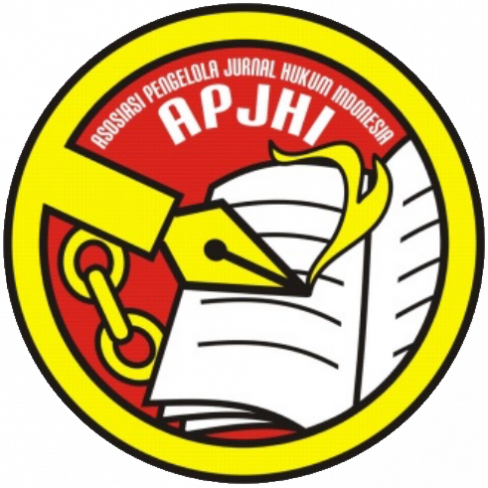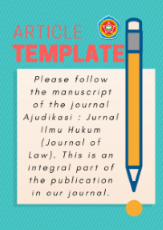Perlindungan Hukum Sinematografi Terhadap Pengaksesan Tanpa Hak Oleh Pengguna Aplikasi Telegram Berdasarkan Undang-Undang Hak Cipta Dan Undang-Undang Informasi Dan Transaksi Elektronik Di Indonesia
DOI:
https://doi.org/10.30656/ajudikasi.v5i1.3218Keywords:
Copyright, Film Piracy, LiabilityAbstract
Film as a cinematographic work is an object protected by copyright. Film and ICT are rapidly growing in Indonesia. Along with this, digital piracy occurs very often. This happens in instant messaging application, Telegram. Public channel is an available feature on Telegram that misused by its users to spread films illegally. This research was conducted to determine regulations about accessing cinematography on Telegram and Telegram Messenger Inc. liability concerns accessing cinematography by its users. The method is juridical normative by examining secondary data from primary, secondary, and tertiary legal materials obtained through literature study related to copyright and over-the-top services. The results show that accessing cinematography on Telegram violates economic rights according to Article 9 (1) b Copyright Law which is categorized as piracy in accordance with Article 113 (4) Copyright Law and Telegram Messenger Inc. as application organizer should be responsible secondarily for piracy in a civil lawsuit according to Article 99 Copyright Law and Article 38 ITE Law, administrative and criminal that occurs due to negligence in monitoring the activities of its users. Then, primary liability can be requested to application users who do not obey the terms of services of the telegram application which has an exoneration clause as a way to prevent copyright infringement in telegram application.
Downloads
References
Buku
Amirulloh, Muhamad. Hukum Teknologi Informasi dan Komunikasi (TIK) Sebagai Hukum Positif di Indonesia dalam Perkembangan Masyarakat Global. Bandung: Unpad Press, 2016.
Amirulloh, Muhamad dan Helitha Novianty Muchtar. Hukum Kekayaan Intelektual. Bandung: Unpad Press, 2016.
Nasution, Az. Hukum Perlindungan Konsumen (Suatu Pengantar). Jakarta: Diadit Media, 2002.
Soelistyo, Henry. Hak Cipta Tanpa Hak Moral. Jakarta: PT. Raja Grafindo Persada, 2011.
Soelistyo, Henry. Plagiarisme: Pelanggaran Hak Cipta dan Etika. Yogyakarta: Kanisius, 2016.
Supramono, Gatot. Hak Cipta dan Aspek-Aspek Hukumnya. Jakarta: Rineka Cipta, 2010.
Jurnal
Arifah, Nanda Putri, dan Carolina Novi Mustikarini. “Paid Promote Sebagai Media Promosi Produksi Delicy Dalam Meningkatkan Konsumen Potensialâ€. Jurnal Manajemen dan Start-Up Bisnis. Vol. 1, No. 3, 2016.
Darwance, et.al. “Dasar-Dasar Pemikiran Perlindungan Hak Kekayaan Intelektualâ€. Progresif: Jurnal Hukum. Vol. 15 No. 2, 2020. DOI: https://doi.org/10.33019/progresif.v15i2.1998.
Friedman, Jonathan A., dan Francis M. Buono. “Limiting Tort Liability for Online Third-Party Content Under Section 230 of The Communication Actâ€. Federal Communications Law Journal. Vol. 52 Iss. 3, 2000.
Lemley, Mark A. “Rationalizing Internet Safe Harborsâ€. J. ON TELECOMM. & HIGH TECH. L. Vol. 6, 2007.
Marbun, Tommy Hottua, et.al. “Perlindungan Hukum Hak Cipta Terhadap Karya Cipta Lagu dan Musik dalam Bentuk Ringtone Pada Telepon Selulerâ€. Jurnal Hukum Ekonomi. Vol. 1 No. 1, 2013.
Ningsih, Ayup Suran, dan Bilqis Hediyati Maharani. “Penegakan Hukum Hak Cipta Terhadap Pembajakan Film Secara Daringâ€. Jurnal Meta-Yuridis. Vol. 2 No. 1, 2019. DOI: https://doi.org/10.26877/m-y.v2i1.3440.
Raharti. “Whatsapp Media Komunikasi Efektif Masa Kini (Studi Kasus Pada Layanan Jasa Informasi Ilmiah di Kawasan Puspiptek)â€. Visi Pustaka. Vol. 21 No. 2, 2019. DOI: https://doi.org/10.37014/visi%20pustaka.v21i2.552.
Setiawan, Ahmad Budi. “Pengembangan Kebijakan Terhadap Penyediaan Layanan Aplikasi dan Konten Pada Ekosistem Digital Melalui Over The Topâ€. Jurnal Penelitian Pos dan Informatika. Vol. 8 No. 2, 2018. DOI:10.17933/jppi.2018.080206.
Taliwongso, Ronna Novy Yosia. “Perlindungan Hukum atas Hak Kekayaan Intelektual Khususnya Merek di Indonesiaâ€. Lex et Societatis. Vol. 2 No. 8, 2014.
Utama, Arya, et.al. “Perlindungan Hukum Terhadap Hak Cipta Lagu dan Musik Menurut Undang-Undang Nomor 28 Tahun 2014â€. Jurnal Unmas Mataram. Vol. 13 No. 1, 2019. DOI: https://doi.org/10.35327/gara.v13i1.65.
Yanto, Oksidelfa. “Konsep Perlindungan Hak Cipta dalam Ranah Hukum Hak Kekayaan Intelektual (Studi Kritis Pembajakan karya Cipta Musik dalam Bentuk VCD dan DVD)â€. Yustitia Jurnal Fakultas Hukum Universitas Sebelas Maret. Vol. 4 No.3, 2015. DOI: https://doi.org/10.20961/yustisia.v4i3.8706.
Peraturan Perundang-Undangan
Undang-Undang Nomor 28 Tahun 2014 tentang Hak Cipta.
Undang-Undang Nomor 11 Tahun 2008 tentang Informasi dan Transaksi Elektronik.
Undang-Undang Nomor 19 Tahun 2016 tentang Perubahan Atas Undang-Undang Nomor 11 Tahun 2008 tentang Informasi dan Transaksi Elektronik.
Peraturan Pemerintah Nomor 71 Tahun 2019 tentang Penyelenggaraan Sistem dan Transaksi Elektronik.
Surat Edaran Menteri Komunikasi dan Informatika Nomor 3 Tahun 2016 tentang Penyediaan Layanan Aplikasi dan/atau Konten Melalui Internet (Over The Top).
Downloads
Published
Issue
Section
License
Authors who publish with this journal agree to the following terms:
Authors retain copyright and grant the journal right of first publication with the work simultaneously licensed under a Creative Commons Attribution License that allows others to share the work with an acknowledgment of the work's authorship and initial publication in this journal.
Authors can enter into separate, additional contractual arrangements for the non-exclusive distribution of the journal's published version of the work (e.g., post it to an institutional repository or publish it in a book) with an acknowledgment of its initial publication in this journal.
Authors are permitted and encouraged to post their work online (e.g., in institutional repositories or on their website) before and during the submission process, as it can lead to productive exchanges and earlier and greater citation of published work.
All articles in Ajudikasi : Jurnal Ilmu Hukum can be disseminated provided they include the identity of the article and the source of the article (Ajudikasi : Jurnal Ilmu Hukum). The publisher is not responsible for the contents of the article. The content of the article is the sole responsibility of the author
Ajudikasi : Jurnal Ilmu Hukum is lincensed under a Creative Commons Attribution-ShareAlike 4.0 International License.










1.png)
.png)
.png)





.png)
.png)
.png)
.png)





.png)







